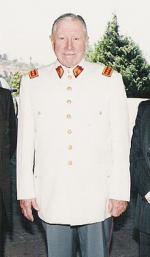Disable ads!
Augusto Pinochet
Augusto José Ramón Pinochet Ugarte, more commonly known as Augusto Pinochet (Spanish pronunciation: [auˈɣusto pinoˈtʃe]; 25 November 1915 – 10 December 2006), was dictator of Chile between 1973 and 1990 and Commander-in-Chief of the Chilean Army from 1973 to 1998. He was also president of the Government Junta of Chile between 1973 and 1981. Pinochet assumed power in Chile following a United States-backed coup d'état on 11 September 1973 that overthrew the elected socialist Unidad Popular government of President Salvador Allende and ended civilian rule. Several academics have stated that the support of the United States was crucial to the coup and the consolidation of power afterward. Pinochet had been promoted to Commander-in-Chief of the Army by Allende on 23 August 1973, having been its General Chief of Staff since early 1972. In December 1974, the ruling military junta appointed Pinochet President of Chile by joint decree, although not with the support of one of the coup's instigators, Air Force General Gustavo Leigh. From its beginning, the new military government implemented harsh measures against its perceived opponents. Various reports and investigations claim that between 1,200 and 3,200 people were killed, up to 80,000 people were interned and as many as 30,000 were tortured during the time Pinochet was in government. Under the influence of the free market-oriented neoliberal "Chicago Boys", the military government implemented economic reforms, including currency stabilization, tariff cutting, opening Chile's markets to global trade, restricting labor unions, privatizing social security, and the privatization of hundreds of state-controlled industries. These policies produced what has been referred to as the "Miracle of Chile," but critics state that the government policies dramatically increased economic inequality. Chile was, for most of the 1990s, the best-performing economy in Latin America, though academics continue to dispute the legacy of Pinochet's reforms. Pinochet's 17-year rule was given a legal framework through a controversial 1980 plebiscite, which approved a new Constitution drafted by a government-appointed commission. In a 1988 plebiscite 56% voted against Pinochet's continuing as president, which led to democratic elections for the Presidency and Congress. After stepping down in 1990, Pinochet continued to serve as Commander-in-Chief of the Chilean Army until 10 March 1998, when he retired and became a senator-for-life in accordance with his 1980 Constitution. However, Pinochet was arrested under an international arrest warrant on a visit to London on 10 October 1998 in connection with numerous human rights allegations. Following a legal battle he was released on grounds of ill-health, and returned to Chile in March 2000. In 2004, Chilean Judge Juan Guzmán Tapia ruled that Pinochet was medically fit to stand trial and placed him under house arrest. By the time of his death on 10 December 2006, about 300 criminal charges were still pending against him in Chile for numerous human rights violations during his 17-year rule, and tax evasion and embezzlement during and after his rule; he was accused of having corruptly amassed at least US$28 million.
 Read more on wikipedia.org Read more on wikipedia.org
 All quotes by Augusto Pinochet All quotes by Augusto Pinochet
 Edit Edit
|

|
|
|
|
|
Background photo by Giuliana
|